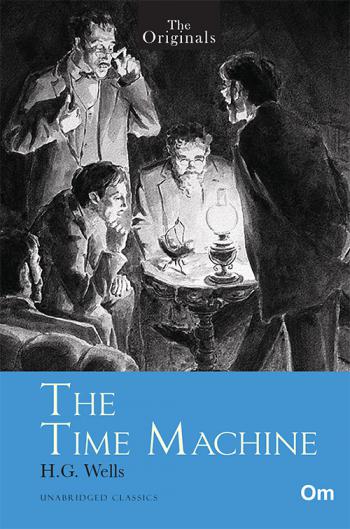The Originals: The Time Machine - Om Books
It sounds plausible enough tonight, but wait until tomorrow. Wait for the common sense of the morning. Born out of H.G. Wells’ literary vision of the future, The Time Machine (1895) is an extraordinary work of early science fiction. A Victorian scientist builds a time machine and lands in the year 802,701 AD. Initially, he is transported to the pastoral idyll of an unknown land which is delightfully peaceful. Soon, however, the paradisiacal façade shatters and he discovers the reality of two distinct species: Eloi are useless, childlike adults surviving on a fruit based diet, and Morlocks who are barbarians thriving underground. The Time Traveller saves one of the Eloi from drowning, and navigates through tunnels to retrieve his time machine that has gone missing. Before returning to his era, The Time Traveller also visits a land where a bloated red sun stares motionless in the sky and the only sign of life is a black blob with tentacles. Once again, the scientist prepares to leave on another time travel, but this time will he return?
HERBERT GEORGE WELLS was born on 21 September 1866, in Bromley, England. In 1874, Wells, the son of domestic helpers-turned-shopkeepers, had an accident that left him bedridden for months. It was during this time that an avid reader was born. His father would bring him books from the local library and Wells would spend hours devouring the written word. Later, when his mother returned to working as a maidservant in a country house in Sussex, Wells found himself in the owner's magnificent library, immersed in the works of stalwarts like Jonathan Swift, Charles Dickens, Sir Thomas More, Plato, Daniel Defoe and others. As a teenager, Wells worked as a draper's assistant but eventually quit. Later, he won a scholarship to the Normal School of Science (later, the Royal College) where he learned about astronomy, biology, chemistry, and physics, among other subjects. All through, Wells nursed the secret desire to become a writer someday. In 1895, following the publication of The Time Machine, Wells became an overnight sensation. The story of an English scientist developing a time travel machine earned him the title of Father of Futurism. Wells' successive books, often termed as 'scientific romances' included The Island of Doctor Moreau (1896), The Invisible Man (1897) and The War of the Worlds (1898) Wells' works reflected the need for a society that flourished on the ideas and principles of global socialism. Published in 1920, The Outline of History is regarded as Wells' best-selling work. A champion of social and political ideas, he also ran for Parliament as a Labour Party candidate between 1922 and 192 The visionary author, sociologist, journalist, and historian breathed his last on 13 August 1946, aged 79.
